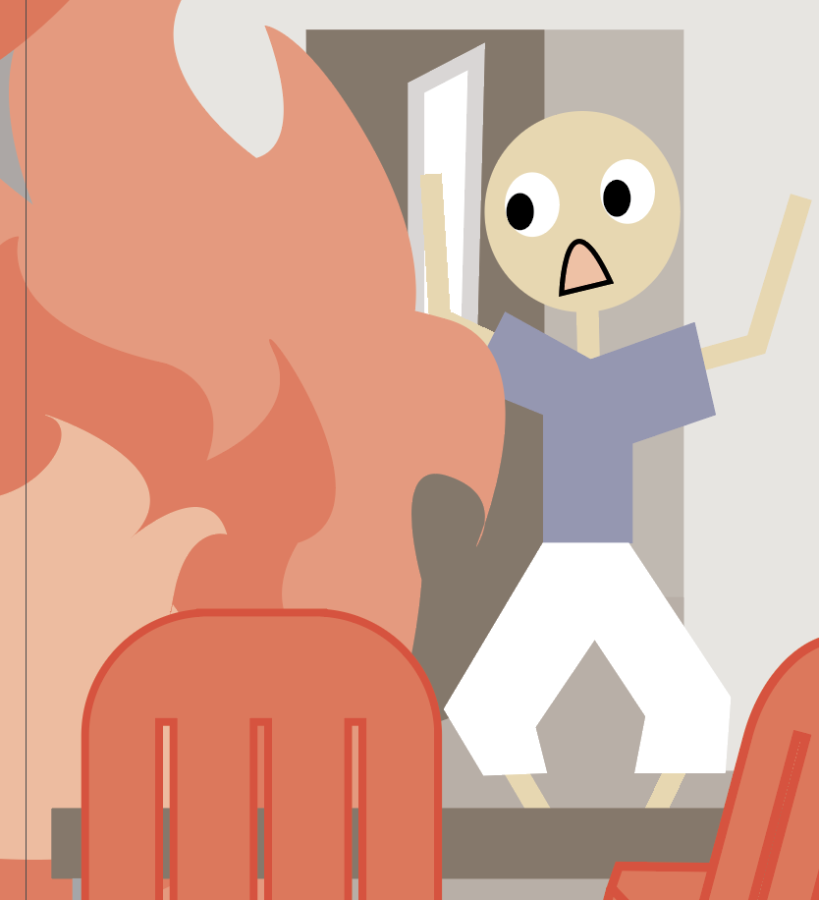The Worst that Could Happen
Not many people really enjoy school — it’s stressful, has time limits, deadlines and a lot of work. All those factors lead to students freaking out, prompting outbursts and misbehavior in class. Of course the students experience this, but no one really focuses on the teachers’ viewpoints of them.
“My first year [teaching] was rough; I had a class of 28, and 25 of them were boys, a tenth of them being on the football team,” social studies teacher Molly Cowan-Johnson said. “It was 7th hour, and was a U.S. History course — they were a handful. They set the room on fire once.”
While Cowan has dealt with classes that are all over the place, she has not directly been yelled at by a student, but she sees and hears a lot of it around school.
“I enter the discipline referrals, so I’ve seen there have been kids who’ve told teachers to ‘f off’ or something,” Cowan said. “I’ve never gotten that response, which is preferable.”
With those teachers who have experienced being cursed at though, a detention given to the student would be assumed.
“We can write kids up and fill out a discipline referral, but that conversation goes up to the admin,” she said. “I haven’t written kids up for anything worse than disrupting class or throwing scissors around a crowded room. You can’t do that — it’s weird.”
With the discipline referral, a student can be written up for a multitude of reasons.
“There are different categories of bad [behavior] — if you’re skipping class, that’s one thing, but if you’re cursing at a teacher, that’s a whole other ballgame,” Cowan said. “I guess it depends on how hard you cussed them out, [though].”
The most common form of misbehavior is ignoring staff members.
“If today’s not your day, I’m assuming something worse is going on than just schoolwork,” she said. “I’m probably going to be like ‘OK, fine, we still have to do [the work] later.’ I’m not really willing to fight it [during class].”
Many students have outbursts caused by mental health, something the school has tried to emphasize the importance of but hasn’t given resources to help.
“Our kids need coping mechanisms,” she said. “Most kids take seven different classes, [and] especially post-Covid, their social anxiety is there. It’s like a crush of ‘Oh my god I have all this stuff to get done’ but then we don’t have any sort of coping mechanisms.”
With so much work and no way to manage, some students end up feeling like they’re drowning.
“[I think the reason so many kids freak out is] the overwhelming-ness of it,” she said. “I have a lot of kids who get behind [and] then they’re like, ‘I don’t want to come to school.’ Then it snowballs and snowballs, and they don’t see a way out. The level of anxiety in our students gets to a point where they just want to scream.”
At the end of the day, both teachers and students get stressed out with late and overdue work.
“In the spring a bunch of seniors don’t want to do anything, then they’re like ‘Oh shoot, I’m failing. Hey, it’s the last day of the semester — here’s everything I’ve done,’” Cowan said. “I don’t like to play that game, [and] I think a lot of the teachers need to think about that.”
In the past when Cowan has dealt with students getting behind, she asks them “What’s the worst that can happen?” She said if a teacher is mad, they’ll get over it eventually.
“I try to be pretty chill with kids,” Cowan said. “We all have deadlines — teachers have deadlines, kids obviously have a deadline — but if it doesn’t happen today, what’s the worst possible thing?”

Katie Kennedy is a senior, and this is her third year on staff. She spent last year as design editor and is now one of the publication editors. Katie is...




